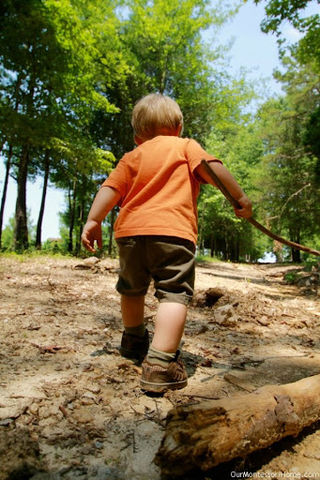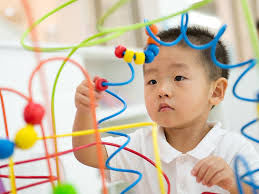Neuroscience
Lessons from a Neurologist’s Grandparenting Journey
Great grandparenting is all about letting them lead.
Posted March 16, 2020

How my neuroscience background helped me learn to be a better grandparent
With my background as a neurologist, classroom teacher, author of parenting and teaching books, and parent of two grown children, I expected that I'd be a sure thing at grandparenting. I knew that my time with grandchildren would offer many occasions for fun and learning. It has indeed, but it turns out I missed many opportunities and made my share of mistakes along the way.
Here, I hope to pass on grandparenting suggestions for building their brainpower and enriching their lives, not only from my perspective as a neurologist but also from what I learned from my mistakes and the changes I've made. Fortunately, I still have plenty of time as they are ages 2 and 5.
Letting them lead
As you have no doubt observed, kids learn very quickly through experience and natural curiosity. This ingrained early development propels powerful learning. This natural curiosity is what drives them to examine objects through multiple senses, from jumping into every puddle they pass to putting things into their mouths before you can blink. It is also how you can further guide their increased understanding of and interest in the world around them.
I did indeed work to promote their curiosity as a tool to activate my grandkids' enthusiasm and interest, but it was with too much direction from me. I wanted to connect their curiosity with opportunities to engage their growing brains in skills such as observation, investigation, and learning from mistakes. The problem was, they missed out when I was taking the lead in directing their curiosity to things I was interested in and knew lots about. With time, I’ve realized that I must hold back and let my grandchildren’s interests and curiosity drive many of our activities to even richer outcomes.
For example, I had to keep reminding myself to stop intruding on their discoveries. It took time, but I gradually stepped back from over-direction and over-teaching, such as spouting out names of trees on a walk, when they were clearly more interested in the bugs below. Their curiosity and attention have become my guides to connect them to extended learning opportunities about their interests, such as reading them an insect book about what they liked (instead of a tree identification book) or thinking together about their questions such as why do some bugs fly and some crawl?
When I stepped back from my agenda as to where to push their curiosity, they responded with even greater delight in their discovery and exploration. They also showed renewed and increased interest in returning to some of the museums or gardens they had rejected. I thought they no longer liked them, but as I relinquished my ownership of how we explored, their interest and excitement returned.

Another example of my learning new approaches to building their focused interest and creative exploration came from research about children and new toys. Instead of showing them the “right” way to use a toy, I stepped back and encouraged them to first explore it independently. As was found in the research, they do indeed show prolonged interest and find more innovative ways to play with these toys than when I showed a "right way" before letting them try it out. As the intense pleasure they experience in their self-exploration is evident to me in their creativity and perseverance, I know it also promotes stronger neural networks of memory banks that will become foundations of their future joyful learning.
Mistakes as tools
All new learning means going from something not known to something known. So naturally, there are going to be times of uncertainty, confusion, frustration, and mistakes. When it came to interacting with my grandchildren's frustration, the words I'd written in my parent and teacher books remained on those pages, not in my brain. I was definitely guilty of my grandmotherly response of jumping in at the slightest hint of their frustration. Things like difficulty hitting a ball or painting a circle, or struggles trying to think of a word to say or read, sparked my "Immediate Rescue Needed" response. I couldn't let them be frustrated—only smiles for my grandchildren. What was, or rather, what wasn't I thinking?
As time went on, I began to recognize that I was being selfish by jumping in so I could feel better. Indeed, they were missing opportunities to build their frustration tolerance, awareness of choices and consequences, and thoughtful decision-making skills. Opportunities for kids to take on challenges, overcome obstacles, and persevere after mistakes are essential. The rapid development of the brains of young children corresponds with the greatest and most fertile growth in their brain control systems for frustration management, tolerance, delay of gratification, other impulse controls, and empathy. My work over the years as a neurologist has helped me to understand how to establish the critical neural networks that support children’s skills, self-regulation, and support them through and beyond childhood. But what I’ve also learned along the way is that you don’t have to be a neurologist to unlock this power. Early childhood is a fruitful time to focus on these qualities – and all parents, grandparents, and caring adults can make this a priority.
The Future
I continue to work to resist my intrusions and, instead, try to serve as a coach or guide on the sidelines. I use more supportive language, rather than immediately jumping in to make everything "right." I love hearing my grandson repeat phrases we'd used together, when he is frustrated or makes mistakes, like, "I can't do it... YET," or "Practice makes progress." Hearing this come from his little mouth is well worth any discomfort I feel during his struggles with the frustration or setbacks. He is learning what works for him and I'm trying to be less intrusive, more of a guide on the side. I'm still a work in progress, just as my grandkids are, but I'm having more fun knowing how we can continue to grow together.




